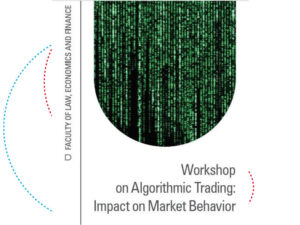The Luxembourg School of Finance hosted the “Workshop on Algorithmic Trading: Impact on Market Behaviour” on 11 and 12 June 2018, aimed at bringing together leading theoretical and empirical researchers of financial markets from all around the world to further the state-of-the-art on the interface of behavioural financial economics and algorithm trading.
There has been proliferation of computerised algorithm traders on electronic exchanges. According to a survey by Glanz and Kissell, automated systems accounted for 85 percent of equity trading volume in 2012. « The flash crash » on 6 May 2010, when the Dow Jones Industrial Average dropped for a short time by 998.5 points only to recover half an hour later almost to its initial value, brought the phenomenon of automated trading systems, in particular high frequency trading, into the public’s eye.
The proliferation of automated systems and the phenomenon of flash crashes have generated a considerable policy debate on whether the presence of automated systems promotes or obstructs healthy markets. Further policy concerns are what steps – if any – should be taken to regulate algorithmic trading behaviour and what responsibilities should be assigned to market exchange providers regarding disclosures of algorithm traders participation, or whether they should be compelled to provide algorithm-free alternatives.
These and related questions surrounding computerized algorithmic trading are being investigated in the ESRC/FNR-INTER project EXPBOT, which the Luxembourg School of Finance at the University of Luxembourg (Principle investigator: Tibor Neugebauer) is jointly investigating with the University of Durham (PI: Jason Shachat; Julian Williams) and the University of Manchester (Sarah Zhang) over the years 2018-2020.
The workshop featured ten sessions of one hour each, including presentation, prepared remarks and discussion from the floor.
Presentation title
Presenter
Discussant
1
Designing A Platform To Research And Teach Algorithmic Trading
Peter Bossaerts
U Melbourne
Burak Can
Maastricht University
2
Fast and Slow Informed Trading
Ioanid Rosu
HEC Paris
Christos Koulovatianos
University of Luxembourg
3
Misdirected by Rule 605: Bias in the Effective Bid-Ask Spread
Bjørn Hagstrømer Stockholm Business School
Kalle Rinne
LIST
4
Price Formation in Financial Markets: Insights From Agent-Based Latent Order Book Models
Michael Benzaquen
Ecole Polytechnique Paris
Julian Williams
University of Durham
5
Order Protection through Delayed Messaging
Dan Friedman
UC Santa Cruz
Alan Kirman
CAMS EHESS Paris
6
Market Microstructure Invariance: A Dynamic Equilibrium Model
Anna Obizhaeva
NES Moscow
Jerome Dugast
University of Luxembourg
7
Humans in Charge of Trading Robots: The First Experiment
Elena Asparouhova
U Utah
Julien Penasse
University of Luxembourg
8
Bargaining Agents versus Human Subjects in General Equilibrium
Steven Gjerstad
U Chapman
Jason Shachat
University of Durham
9
High-Frequency Trading in Extreme Market Conditions
Sarah Zhang
U Manchester
Michael Mitzkewitz
University of Luxembourg
10
Arbitrage Bots in Experimental Asset Markets
Martin Angerer
U Liechtenstein
Laszlo Sandor
University of Luxembourg

The workshop achieved its goal, to disseminate knowledge of leading research groups, methods and analysis of algorithmic trading and to provide a multi-disciplinary discussion forum. The multi-disciplinarity of workshop participants and the diversity of perspectives in talks and prepared remarks led to a vivid and valuable discussion.
The Luxembourg event was the first of three workshops planned throughout the EXPBOT project. The next workshop on Algorithmic Trading will be organized at the University of Durham in 2019. At the end of the EXPBOT project, in 2020, a policy forum is planned at the University of Manchester.

